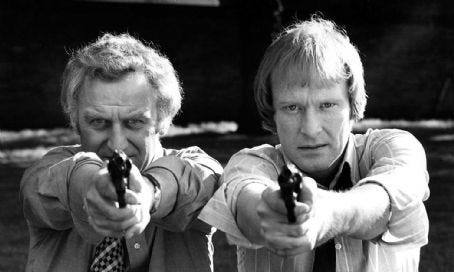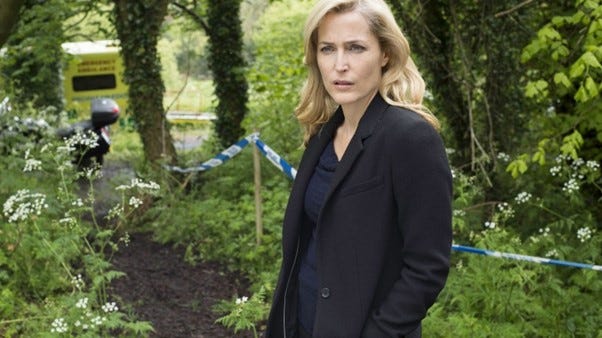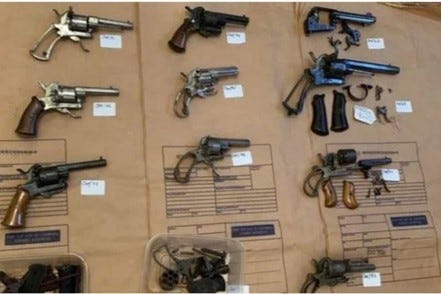Model 10 revolvers and ‘squad haircuts’ - when cop dramas really were cop dramas
I was once minding my own business in the back yard of a police station when a bossy young woman appeared. Looking me up and down from behind her Ray-Bans, she snapped at me to “hurry up and join the others.” Then my radio crackled and she realised I was a real policeman, not one of the extras she was herding for the TV series being filmed at the nick. It was an episode of a cop drama starring the ex-Eastenders actor (and convicted murderer) Leslie Grantham. I suppose her thinking I was an extra gives you a good idea of what I looked like in uniform.
I’ve previously shared my thoughts on cop dramas when I wrote about Line of Duty. Given the UK’s most popular police show focuses on a bent-cop infested force, it tends to divide opinion among many in blue. The luckier ones zone out the nonsense and enjoy LoD for what it is (Game of Thrones with warrant cards and stab vests). Others can’t.
I usually, but not always, sit in the latter camp. So I decided to write about stuff that irks me when watching TV and movie cop drama. Every police officer’s partner knows what I’m talking about – how many evenings in front of Netflix have been spoilt by your significant other bemoaning the lack of realism in a cop show? Mind you, if you think cops are bad try watching a war movie with a veteran.
I also began thinking about police dramas with zero realism which I still find enjoyable. Luther immediately springs to mind. What’s the secret ingredient? Where do the ‘X’ and ‘Y’ axis between credibility and enjoyment meet? I think the answer, apart from straightforward entertainment value, involves world-building. This probably deserves further discussion, but it shall have to wait. This post is for me to grumble like an old man shouting at bees.
Also bear in mind I’m coming at this from two potentially contradictory perspectives as (a) I write fiction and (b) I was a policeman (well, that’s what it said on my pay slip). I’m fully aware of the need for artistic licence, but although you can take the man out of the police, I’m not sure you can entirely take the police out of the man. A base level of granularity is important. Establish that, then take liberties.
Anyhow, in no particular order, here’s a few of my crime drama bugbears. There are others (there really are, but there’s only so much server space available on Substack). I have awarded each a harshly-inflated and totally unfair Grouchy Retired Copper (GRC) score out of ten. As usual, creatives who wish to buy me steak, chips and a decent bottle of red are free to receive an in-person rant about this stuff.
“This is my crime scene!”
Gillian Anderson models Prada’s new PPE in ‘The Fall’
This one is especially prevalent in US crime dramas, where ‘Detective’ is a rank (which it isn’t in the UK). It creeps into UK programs too, as detectives are still technically responsible for crime scenes. They’re just not allowed to be quite so rude about it.
Okay, it’s your scene, Detective?
In which case why are you and your partner the only schmucks not dressed in the correct barrier equipment and thus likely to (a) contaminate evidence and (b) get chewed up in court by a lawyer for not wearing it? Everyone else is suffering horrible paper suits, plastic over-boots and masks. Yes, they look like they’re at a Teletubby convention. Tough. TV detectives need to stop noodling around crime scenes wearing Prada and picking up revolvers with the tip of a pencil.
Do you see what you’ve gone and done now? My blood pressure’s rising already.
GRC score: 8/10
MI5 aren't the KGB.
I worked with spooks as part of my job, which isn’t particularly unusual if you’ve been in counterterrorism. So I sigh when political thrillers of a certain stripe show MI5 spinning cunning webs of deep state treachery (as opposed to fobbing off surveillance on half-witted Jihadis to the police every Friday afternoon).
I never thought I’d feel sorry for MI5, who in my day would happily piss down your back and tell you it was raining. Nowadays, the modern Security Service is full of earnest, studenty young people, the Thames House canteen more Starbucks than Smiley’s Circus. And although there are (more or less baked-in) tensions between the police and MI5, they’ve learnt to rub along together well enough. And MI5 really isn’t a Gestapo analogue comprised entirely of elderly white men (the real-world Service has long been a worthy standard-bearer of gender balance; easily half of the Security Service officers I met were women).
There’s nothing wrong, of course, with writers making the intelligence services the bad guys. I’d just argue it’s difficult to do credibly unless you understand the nature of the beast and what it’s trying to achieve. On the other hand, MI5 officers don’t often carry guns, never arrest people or have car chases either.
GRC score: 5/10
GRS (Grouchy Retired Spook) score: 10/10 and he or she is going to write an angry private letter to the editor of ‘The Times’ (who was in the year below them at Oxford)
Crime is Business and Business is Crime
Glossy. Stylish. Silly.
TV writers often play with similarities between organised crime and corporate business. Different factions of beautifully-dressed gangster CEOs from a spectrum of cultures and ethnicities meet in swish hotels to divide the spoils like Californian tech bros. Capitalism, eh? It’s all the same.
I suspect, for some creatives, this partially scratches their guilt-itch about earning shitloads of money working for cutthroat corporate businesses that harbour criminals like, er, the global entertainment industry.
This comparison might hold true in failed states and narco-regimes where organised crime is systemic to the point of normalisation. Mafias and cartels inveigle their way into politics and culture like knotweed, which is why Palermo magistrates need to check under their cars every morning and why Sicario feels like a documentary.
The problem is, for British writers, our crime model is completely and utterly different. The UK, with its centralised government and traditional class strictures, means organised criminals remain (by and large) working-class outsiders. This isn’t to say British gangsters don’t manage their affairs with a level of informal but brutal efficiency. They do, and many businesses would envy their lack of HR or compliance regimes and laser-like focus on performance and outcomes. There is, however, a fair bit of due diligence and risk management required. You seldom see this depicted in British TV or movies in a satisfying way.
America, of course, has The Sopranos. We still don’t.
For me, possibly the best chronicler of British organised criminal culture is Guy Ritchie. His stuff is fanciful, sure, but feels right more often than not. Having said that, the final plot twist in RocknRolla is pretty on-the-money. And, having briefly worked on the Met’s telephone-hacking investigation (I don’t think anyone covered themselves in glory there), I think I’ve met a few of the people Hugh Grant’s character in ‘The Gentlemen’ is based on. For me, Grant steals the film, making you wonder what the fuck he was doing in those romantic comedies.
I digress.
British law enforcement divides crime into three levels using the mind-numbingly boring National Intelligence Model, 1 being the lowest (i.e. volume crime like burglaries) and 3 the highest (organised and international). Level 2, being the middle-market (especially in drugs) is usually where the action is. It’s also the most widely ignored by the police when I was still serving. This was for a variety of reasons, which I might discuss in another post. I wonder if any NCA types agree? Anyhow, organised crime investigators will tell you it’s axiomatic every decent Level 3 job sits on a Level 2 job – which is to say if you want to take out the top guys, you need to target middle-management.
If you want to see a masterclass in TV drama illustrating this, superbly weaving character and plot with procedure, I give you ‘The Wire.’ It’s quite possibly the finest cop show ever made. I await the day British TV creates anything as beautiful and complete, but I won’t hold my breath.
Anyway, what does the Other Side think? Having met a fair few criminals who’ve done serious bird, many cite ‘Layer Cake’ as their favourite crime movie. I particularly rate the movie’s depiction of criminal use of firearms and the role of ballistics – more of which later. Oh, and the scene where Morty pours scorching hot tea all over some poor bastard’s boat-race was where I used to have breakfast when I worked at Scotland Yard.
GRC score: 6/10
Yes Guv!
Jed Mercurio loves this, bombarding the viewer with police argot to give a veneer of realism. Remember ‘Bodyguard’, where Sergeant David Budd’s team call him ‘Skipper’ or ‘Skip’ every five bloody seconds? Skipper’s a Met Police affectation for a uniform sergeant. In any case, people seldom call their line managers by their rank these days (as for CID, I’ve never heard a DS called ‘Sarge’ or ‘Skip’). I think writers use this sort of formality as a blunt instrument to make the police feel dramatic and different. In reality, it’s a place of work remarkably similar to many others. Like many minor irritants, this one’s disproportionately annoying.
Guv’nor (or ‘Guv’) is indeed a term used in the Met for officers of inspector rank and above, especially in the CID. ‘Gaffer’ is the northern police equivalent. I think in the West Country they might say ‘Yarp’ (ha ha!). You’ll also hear ‘Boss’ and if the manager in question is a complete tool then ‘Sir’ and ‘Ma’am’. I’ve also met a sergeant known as ‘Aquafresh’ (he was a tube with three stripes).
On the other hand, I’ve met superintendents who are happy to be called by their first names and inspectors who want to be treated like Ottoman sultans. Police officers are humans. As a Detective Superintendent once told me, some are stars, some are wankers.
CRC score: 8.5/10
We have ways of making you talk
Okay, realistic PACE interviews don’t make good drama – an hour of some bolshy scrote chanting ‘No Comment’ to very simple questions isn’t my idea of entertainment either.
Mind you, you could mix things up and remain realistic; have you ever seen a prepared statement get filleted by a clever interviewer, leading to a no comment defence strategy crumbling? I have (it wasn’t me, by the way). Or a carefully planned interview with an overly-entitled posh bloke, gently needling his pride to the point where he ignores his solicitor and starts talking (that was me and it was fun). I don’t think I’ve ever seen a proper ABE interview on telly either.
My biggest bugbear, though is rank. How many Detective Chief Inspectors interview serial killers alone in a darkened room with no lawyer or tape recorder? Well, all the time… on the TV. The most common rank to interview a criminal would be a constable (detective or otherwise) and there would almost certainly be a lawyer present. Serial killers? Whoah. We’d wheel in a full Tier III interview team with specialist detectives running a comprehensive interview strategy with video and audio.
But no – a DCI chats up the murderer with three minutes of pop-psychology, a flinty eyed stare and a cuppa – cue confession. What you don’t see is a judge slinging the interview out at court as inadmissible for grotesque breaches of PACE six months later.
GRC score: 8/10
Follow me!
We reach the season finale and the SFO team is stacking up on the suspect’s door. At this point the main characters (usually CID officers) charge in with the firearms team. Or, even worse, before them. This never happens. Ever. Armed ‘dig-outs’ are carefully planned and conducted by firearms ninjas - it's their show. They’re very good at it and will deliver your suspect unto you handcuffed, compliant and thoroughly disarmed. Don’t ask them to do anything else though (that cross-trainer ain’t gonna pump itself).
GRC score: 9/10
Just the Two of Us
I appreciate the confines of drama occasionally requires focussing on a couple of characters, but a DI and a DS won’t solve anything driving around Oxfordshire all day drinking warm beer. In the real-world, DIs are in meetings or writing decision logs.
The poor bloody infantry of criminal investigation – the DCs - are doing the stuff drama finds interesting – following leads (in bigger cases generated by a HOLMES suite), interviewing witnesses, seizing exhibits and actually arresting bad guys. As someone who was formerly one of these worker drones, I can say it’s terribly annoying for the television industry to suggest Gillian Anderson’s going to track down the psycho-killer solo.
GRC score: 9/10
Hiding in Plain Sight
Part of me is pleased the entertainment industry gets surveillance so very, very wrong. It’s probably why it remains an effective tactic. No, our heroes sit across the street in a car taking photographs as if they’re wearing a magical cloak of invisibility. I think you could show surveillance in a dramatic way without compromising the tactic. It would be far more entertaining, and less insulting to the viewer’s intelligence, than the way it’s currently shown.
GRC score: 9/10
Armed and Dangerous
Typical firearms seizure by the Met circa 2020. Or possibly Montana, 1879?
In too many British cop dramas the villains carry Uzis, Kalashnikovs and all sorts of military-grade hardware. I’m not saying this never happens, but it’s rare. British criminals typically use not-very-glamorous ‘metalwork.’
The primary reason is the twenty-odd mile stretch of water we call The English Channel, making it relatively difficult for criminals to smuggle guns into the UK. It’s not impossible, but the risk-to-reward ratio isn’t really in a criminal’s favour. Not in an unarmed society where you can enforce drug supply using gangs armed with melee weapons.
Secondly, in all my time in the police the shortage of guns wasn’t the real issue for criminals – it was the shortage of ammunition. There simply isn’t the stuff available to steal here. This leads to all sorts of home-brewed ammo craziness, with ersatz bullets going off all over the place… except for the intended target. I remember gang members admitted to hospital with gunshot injuries to their legs and feet – most of them from accidental discharges of their own weapons. A trip to the SCO19 criminal weapon collection at Gravesend is like visiting a WW2 armoury by way of ‘Mad Max’.
As you can see from the image above, when the police find weapons its often antique kit; revolvers, shotguns, hunting pieces, small-calibre self-loading pistols and reactivated weapons are commonly used in crime. Not that you’d believe it if you were watching stuff like this.
However, this gun-fest remains the funniest shootout in British cinematic history so occasionally we can let this one go (this is reflected in the GRC score – fix bayonets!).
GRC score: 5/10
There you have it, my not even remotely exhaustive list of TV and movie cop bugbears. I hope it was of interest and feel free to pitch in with your own. And if you work in the industry, I’m usually available and the average price of a decent T-bone, chips and a bottle of red at Hawksmoor is less than a seventy quid!








As a friend of Dom's and having been on the same jobs ( although unknowingly at the time) I'd just like to point out that NO SFO would ever "knowingly" be seen dead on a crosstrainer!!! Heavy metal all the way!!!
Agreed! Hugh Grant was brilliant in "The Gentlemen" Remind me to tell you about a stupid surveillance job I did once which ended up with me and another officer sat opposite the subject's address, looking like something out of the Bill